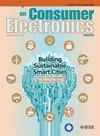消费类电子产品节能自主系统的智能决策支持系统
IF 10.9
2区 计算机科学
Q1 ENGINEERING, ELECTRICAL & ELECTRONIC
引用次数: 0
摘要
本文提出了一种基于人工智能的决策支持系统,用于提高消费电子产品中自主系统的能源效率。主要目标是通过利用先进的递归神经网络(rnn)结合自适应矩估计(Adam)来优化能耗。拟议的智能框架结合了实时数据处理、预测和自适应决策,以减少各种设备的能源使用,如智能恒温器、机器人真空吸尘器和支持物联网的照明系统。关键的方法包括集成rnn来建模时间能量消耗模式和Adam优化器来进行有效的模型训练。结果表明,与传统方法相比,该方法显著节省了能源,提高了预测精度。研究结果表明,基于人工智能的系统可以在保持或提高设备性能的同时大幅降低能耗。这项研究对节能消费电子产品的未来具有重要意义,特别是随着对智能设备需求的增长。本文章由计算机程序翻译,如有差异,请以英文原文为准。
Intelligent Decision Support Systems for Energy-Efficient Autonomous Systems in Consumer Electronics
This paper proposes an AI-based decision support system for enhancing energy efficiency in autonomous systems within consumer electronics. The primary objective is to optimize energy consumption by leveraging advanced Recurrent Neural Networks (RNNs) combined with Adaptive Moment Estimation (Adam). The proposed intelligent framework incorporates real-time data processing, prediction, and adaptive decision-making to reduce energy usage across a variety of devices, such as smart thermostats, robotic vacuum cleaners, and IoT-enabled lighting systems. Key methodologies include the integration of RNNs to model temporal energy consumption patterns and the Adam optimizer for efficient model training. The results demonstrate significant energy savings with improvements in prediction accuracy compared to traditional approaches. The findings suggest that the AI-based system can provide substantial reductions in energy consumption while maintaining or improving device performance. The research has important implications for the future of energy-efficient consumer electronics, particularly as the demand for smart devices grows.
求助全文
通过发布文献求助,成功后即可免费获取论文全文。
去求助
来源期刊
CiteScore
7.70
自引率
9.30%
发文量
59
审稿时长
3.3 months
期刊介绍:
The main focus for the IEEE Transactions on Consumer Electronics is the engineering and research aspects of the theory, design, construction, manufacture or end use of mass market electronics, systems, software and services for consumers.

 求助内容:
求助内容: 应助结果提醒方式:
应助结果提醒方式:


